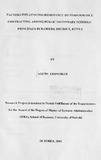| dc.description.abstract | The genesis of performance contracting scheme by the Ministry of Education to secondary school principals encountered sharp reactions before it was implemented. Secondary school principals were not sure about what was expected of them. They need to be given timely and correct information so as to see why a change was needed and what future plans it entailed. Therefore, there was a need to carry out a study on the factors influencing resistance to performance contracting among secondary school principals. The population of interest was public secondary school principals in Rarienda District. There were 34 principals in Rarienda District. The study was a descriptive survey; questionnaire was used for collecting information from all 34 secondary school principals. In this study primary data was employed, questionnaires which were semi- structured and centered on factors influencing resistance to performance contracting by secondary school principals were used. The questionnaire had 2 sections; section A was used to collect general information about the respondent. Section B concentrated on factors influencing resistance to performance contracting. The semi-structured questionnaires were taken to the schools and collected later by the researcher. The data collected was analyzed using descriptive analysis. This was done puiposely to describe basic features of data in the study. Frequency tables, mean scores, graphs, charts and percentages were employed to analyze the collected data. The findings showed that the secondary school principals in Rarieda District had inadequate knowledge on performance contracting and they felt that their personal freedom was threatened. They were not given timely and correct information so as to see why a change was needed. In the same vain most secondary school principals in Rarienda District maintained that the
reasons for performance contracting were unclear, and that adequate consultation had not been done before hand and performance contracting scheme was being offered to them as an accomplished fact. In this study, it was concluded that performance contracting by secondary school principals was not well received due to inadequate information; it was therefore constantly received negatively. The researcher recommended that there was need for secondary school principals to undergo training on performance contracting so as to know exactly what they were being asked to sign and to enable them make informed decision about performance contracting. | en_US |

